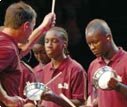National Standards
FMS National Standards for Instrumental Teachers ©
Download the FMS National Standards for instrument teachers (Word .doc)
FMS’s vision for the National Standards for Instrument teachers is to help every child have access to musical instrument teaching of a high and consistent standard. Our intention is that the standards should:
- attract staff to the profession
- provide a benchmark for the Initial Training of instrumental teachers
- benchmark Induction and Standards of Excellence
- benchmark the monitoring and observation of instrumental teaching
- promote and exemplify high and consistent standards of teaching and the impact of these on learning
- aid Performance Management and Self-Review
- help to promote the professional status of instrumental teaching
The standards were endorsed by FMS membership at the Burning Issues Conference in March 2005.
All instrumental teachers working in schools, colleges and centres on behalf of Local Authorities must demonstrate that they meet these standards. The standards relate to instrumental and vocal teaching, including tuition which is part of the ‘Wider Opportunities in Music’ programme involving larger groups of children. Although the standards overlap with those for classroom based school teachers, they are distinct in several key areas. Fulfilling the standards for instrumental teaching does not provide evidence of meeting the standards for classroom teachers, and vice versa.
Standard 1 Professional Values and Practice
Instrumental teachers must uphold the professional code of the General Teaching Council for England by demonstrating all of the following.
Instrumental teachers have high expectations of all pupils; respect their social, cultural, linguistic, religious and ethnic backgrounds; and are committed to raising their educational achievement.
They treat pupils consistently, with respect and consideration, and are concerned for their development as learners.
They demonstrate and promote the positive values, attitudes and behaviour that they expect from their pupils.
They communicate sensitively and effectively with parents and carers, recognising their roles in pupils’ learning, and their rights, responsibilities and interests in this.
They contribute to, and share responsibility in, the corporate life of music services and schools.
They understand the contribution that other professionals make to teaching and learning, including classroom teachers and support staff.
They improve their own teaching, by evaluating it, learning from the effective practice of others and from evidence. They are motivated and take increasing responsibility for their own professional development.
They are aware of, and work within, the frameworks relating to the responsibilities of instrumental teachers and schools.
Standard 2 Knowledge and Understanding
Instrumental teachers should have a secure and up-to-date knowledge and understanding of music, including the appropriate practical skills in relation to the instrument(s) taught and the standards of the students. New entrants should have evidence based successful performing experience. Graduate entrants should have a degree or diploma from a recognised institution. Accredited teachers should have undertaken accredited professional training from a recognised training body recognised on the National Qualifications Framework.
They know, understand and use a recognised instrumental teaching curriculum e.g. A Common Approach that is appropriate to the range of pupils that they teach.
They know about and understand how to plan for groups of mixed ability pupils.
They have knowledge of relevant repertoire and resources for the instrument(s), and groups and ensembles they teach, including knowledge of different musical styles and genres.
The have knowledge of relevant qualifications in music for their pupils, including an understanding of music in the National Curriculum, and the practical elements of GCSE, AS/A2 and vocational examinations in music.
They understand how pupils’ learning can be affected by their physical, intellectual, linguistic, social, cultural and emotional development. They know about different approaches to learning, including those that relate to group learning.
They know how to incorporate digital technology effectively in their teaching.
They know how to apply strategies that establish a purposeful learning environment and promote good behaviour.
They have knowledge of and comply with professional regulations including health and safety and child protection.
Standard 3.1 Teaching - planning and expectations
Instrumental teachers set challenging teaching and learning objectives, which are relevant to the pupils that they teach.
They base these on their knowledge of:
• the pupils
• evidence of the pupils’ past and current achievements
• the range of standards appropriate for the age range of pupils
• the range and content of activities relevant to the pupil being taught
They use these teaching and learning objectives to plan lessons, and sequences of lessons, showing how they assess the pupils’ learning.
They differentiate the learning and plan for differentiated outcomes to meet the needs of the pupils they teach, including those with special educational needs, the gifted and talented, and those from different backgrounds.
They select and prepare resources, including repertoire and activities, taking into account the interests, language and cultural background of each pupil.
They use a range of strategies, including conducting techniques where appropriate, to promote good ensemble playing in lessons and larger groups.
They take part in, and contribute to, teaching in teams where appropriate. Where applicable they plan work in collaboration with classroom teachers.
They plan and deliver broad and balanced programmes of study that promote and develop musical playing and singing in the interrelated areas of:
• listening and internalising
• making and controlling musical sounds: developing technique
• creating, developing and interpreting musical ideas
• playing/singing
• playing/singing with others
• performing and communicating
They plan effectively to use musical applications of digital technology in their lessons where appropriate.
Standard 3.2 Teaching - monitoring and assessing
Instrumental teachers make appropriate use of a range of monitoring and assessment strategies to evaluate pupils’ progress towards planned learning objectives and standards, and use this information to improve their own planning and teaching.
They monitor and assess as they teach, giving immediate and constructive feedback to support pupils’ learning. They demonstrate, using their instrument and voice. They involve pupils in reflecting on, evaluating and improving their own performance and that of others.
They utilise a range of manageable assessment techniques, ensuring that the progress of all pupils is tracked and monitored: they make effective use of teacher, peer and self-assessment techniques.
They are able to assess pupils’ progress accurately, using attainment levels agreed by the authority e.g. grade examinations and A Common Approach . They use other music assessments where appropriate e.g. GCSE examinations.
They identify, support and monitor the progress of pupils who may be gifted or talented in music. They support pupils who are failing to achieve their potential in learning, or who experience behavioural, social, emotional or other learning difficulties. They make good use of guidance from experienced teachers where appropriate.
They record each pupil’s progress and achievements systematically to provide evidence of the range of their work, progress and attainment over time. They use this to help pupils review their own progress and to inform planning.
They are able to use records as a basis for reporting on pupils’ attainment and progress orally and in writing, concisely, informatively and accurately for parents, carers, other professionals and pupils. They use pupil notebooks to set homework and communicate regularly with parents/carers.
Standard 3.3 Teaching - management of pupils
Instrumental teachers have high expectations of each pupil and build successful relationships, centred on teaching and learning. They establish a purposeful and musical learning environment, where diversity is valued and where pupils feel secure and confident.
The can teach the instrument(s) to the expected knowledge, understanding and skills relevant to each pupil. They use schemes of work and adopt differentiated approaches appropriate for the age, aptitude and attainment of all pupils. Their teaching is geared to group work, but is also applicable to individual pupils.
They teach clearly structured lessons or sequences of work which interest and motivate their pupils and which:
• make learning objectives clear to each pupil
• promote active learning that enables pupils to think independently and to manage their own learning
They employ a variety of activities and interactive teaching methods that are appropriate for groups of pupils, larger classes and ensembles. They have the necessary skills to direct pupils in performance where appropriate. They promote independent learning of pupils in rehearsal and performance.
They differentiate their teaching to meet the needs of all their pupils, including the more able and those with special educational needs. They have strategies to manage groups of mixed ability.
They take account of the varying interests, experiences and achievements of boys and girls, and pupils from different cultural and ethnic groups, to help individual pupils make good progress.
They organise and manage teaching and learning time effectively, including lessons, practices and rehearsals.
They organise and manage the physical teaching space, instruments and music safely and effectively with the help of other staff where appropriate.
They set high expectations for each pupil’s conduct, and establish a clear framework that promotes self-control and independence. They manage pupils’ behaviour constructively.
They take responsibility for teaching pupils over a sustained period of time. They are able to teach appropriately for the age and ability range of their pupils.
They provide pupils with practice strategies to extend work in lessons and encourage pupils to make music independently.
They collaborate with, and where appropriate work alongside, classroom teachers and other colleagues to enhance pupils’ learning.
They recognise and respond effectively to equal opportunities issues as they arise in their teaching, following relevant policies and procedures of the music service and schools in which they teach.
Standard 4 Wider Professional Effectiveness
They take responsibility for their own professional development and use the outcomes to improve their teaching and their pupils’ learning.
They have an awareness of how their own work fits into broader musical contexts of the school and community.
They make an active contribution to the policies and aspirations of the music service they work for and the schools in which they teach.
They contribute to music service and school activities that are arranged to promote the progress of their pupils, including parents’ evenings and performing opportunities.
They challenge and support all pupils to do their best through:
• inspiring trust and confidence
• motivating learners to achieve their potential in all aspects of music making
• their commitment to working in a team
• their analytical and reflective thinking
• their positive action to improve the quality of pupils’ learning and the quality of their teaching


